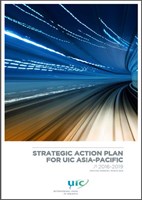
On 10 May 2016, the UIC Asia-Pacific Region made its Vision 2050 document publicly available, presenting the main areas of railway development for the world’s largest railway networks.
During this workshop which brought together over 50 participants, Vincent Vu, Director of Institutional Relations, Coordinator of the UIC Asia-Pacific Region (who commissioned the document), Yoshihiro Hono, representing Mr Satoshi Seino, Chairman of the Asia-Pacific Region and Head of the Project, as well as Raimondo Orsini, Director of the Sustainable Development Foundation in Rome, presented the work and identified the main development strategies for the 40 members of the region. The document is the result of a year’s work with the contribution of all the member railways of the Asia-Pacific Region.
This document is a decision-making tool to identify and validate the implementation of actions which could benefit all stakeholders. Providing indicators for socio-economic and transport development for all countries – whether current or future members of UIC – the document also provides a methodology, a study grid and selection of major projects of common interest.
The document is divided into three-year strategic action plans. The action plan for 2016 – 2019 has already been approved, along with a detailed presentation of the 21 actions to be selected between now and 2017 by and for the members.
This workshop concluded with the presentation of the prospective benchmarking study on the methods of identifying cracks in rails by Dr Kim Sunhee from Korea Railroad Research Institute, by comparing current methods with those in progress in the most innovative research institutes in Asia and around the world.
About UIC
UIC mission:
- to promote rail transport at world level and meet the challenges of mobility and sustainable development.
Main UIC objectives:
- facilitate the sharing of best practices among members (benchmarking)
- support members in their efforts to develop new business and new areas of activities
- propose new ways to improve technical and environmental performance
- promote interoperability, create new world standards for railways (including common standards with other transport modes)
- develop centres of competence (High Speed, Safety, Security, e-Business, …)




Comments
There are no comments yet for this item
Join the discussion